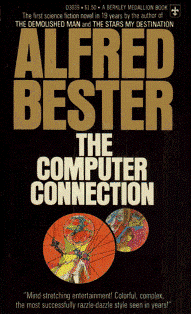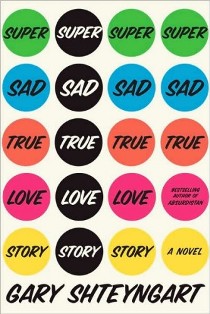Over in the bizzaro world of literary fiction, Gary Shteyngart is kind of a big deal. With praises from academic circles and The New Yorker, the idea of him secretly being a science fiction author doesn’t spring to mind. So, did this guy really just write one of the best Science Fiction books of the year? You better believe it. And I think he was channeling Alfred Bester the whole time.
Super Sad True Love Story takes place in the near future, and takes the future it inhabits very seriously. Here nobody reads physical books because books are “smelly,” America is run by a monolithic political entity called the bipartisans and an oversexed society sports transparent jeans called onionskins. Luckily, there are a lot of laughs along the way, but ultimately this is thinking-person’s novel and the sort of writing that should make every science fiction fan proud of what the genre can do.
Sure, this book isn’t really being marketed as science fiction, but in terms of the novel’s quality, that fact is neither here nor there. For the sake of this review, I’ll leave the discussion of why certain writers fly under different banners for another time. The book is science fiction quite simply for the fact that if the SF elements were removed, there would be no book. And what is this book about? Well, all sorts of stuff.

The plot revolves around a character named Lenny Abramov, living in a future New York City and working in something called Post-Human Services. Essentially, this is a company where people are figuring out how to extend their lives through various artificial and dietary changes. Lenny’s boss, Joshie, a 70-year-old man who Lenny reveres as a father figure, looks outwardly to be a 30-something. Lenny, meanwhile is getting older, and feeling it desperately. Early on in the book he falls madly in love with a 24-year-old woman named Eunice Park, and that’s where things start to get interesting.
True to its title, this book is basically a love story. But the nice thing here is we get this love story from both sides. In the first half of the book everything we learn about Eunice comes directly from messages she sends to friends and family on her Global Teens account. (Think of Global Teens as an all-encompassing version of Facebook.) Her messages are filled with all sorts of future jargon and slang which immediately immerse the reader in the future-world Shteyngart is weaving. People have new advanced forms of slang like our OMG. For example TIMOTOV translates into “Think I’m About to Openly Vomit!” and “teening” means to send messages on your Global Teens account. There are more, but I think you’ll have to read the book to find out what “JBF” stands for.

BTW, everyone has a Global Teens account in this book, even 39-year-old Lenny. The characters access and “stream” all forms of data on a portable device called an ÄPPÄRÄT, which is basically an iPhone on steroids. The ÄPPÄRÄT is constantly on, and serves as a de facto form of identification. By just walking down the street or into a bar, everyone around you instantly has access to everything from your credit score to your baby pictures.

The critique of a twittering society on information overload is readily apparent, but what makes this plot convention work is how quickly the reader recognizes the ÄPPÄRÄT as natural and likely progression of the technology which envelops us today. And while Shteyngart doesn’t get too preachy with any of this stuff, there are some pretty disturbing moments. At one point all of New York loses ÄPPÄRÄT service and hordes of people fall into deep depression. During this time, Eunice continues to write letters on Global Teens to her friends and family which are punctuated by eerily familiar error messages telling us that her e-mails aren’t getting through. But she keeps writing all the same. The notion of Eunice re-discovering the act of simply writing down her thoughts for the sake of self-therapy and for no other reason is heartbreaking and great at the same time.

Throughout this book, I was reminded of one of SF’s great authors; Alfred Bester, specifically his highly-underrated novel The Computer Connection. Like Super Sad True Love Story, The Computer Connection depicted a future full of slang and abbreviations. People would refer to a dead-language called XX, which was essentially 20th Century English. Also like Shteyngart’s book, Bester imagined a future where advertisements were so intrusive that one was literally assaulted by endless data everywhere they went. Both books also deal with immortality as Bester’s molecular men are literally a rag-tag group of immortals looking to recruit new members.

With Shteyngart, the idea is immortality is less obtainable, and Post-Human Services more of a helpless sort of race against death. Even if Shteyngart hasn’t read Bester, one of his characters has when they declare “…for the true subject of science fiction is death…” And while I’m not sure I totally agree, it is clear that everyone from Mary Shelley to Bester has been trying to figure out the ways people will try to outrun or turn back their ever-ticking life-clocks.
So, if you squint a certain way, this book could look like a prequel to The Computer Connection and not in a bad way. Super Sad True Love Story is using science fiction to communicate a love story we can all relate to while at the same time scaring the crap out of us with a cautionary tale. Hopefully, Shteyngart and others in literary world will give us more like this!
Ryan Britt’s writting has appeared with Nerve.com, Clarkesworld Magazine, Opium Magazine, Brooklyn The Borough and elsewhere. He prefers the book version of Logan’s Run because there is a spaceship in it.










